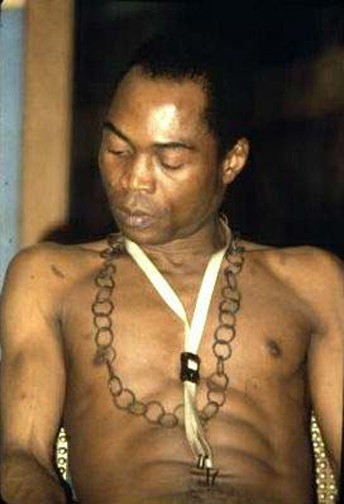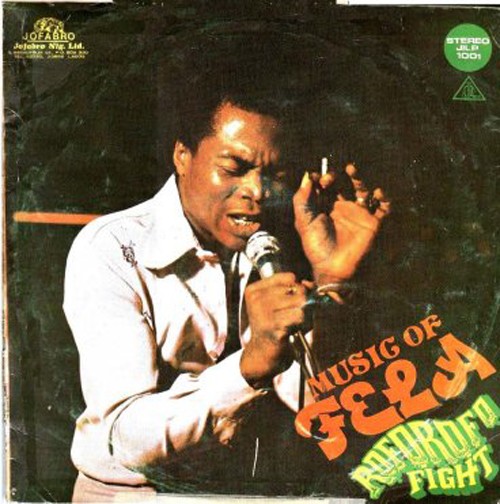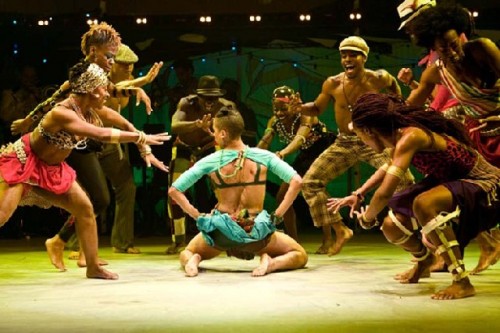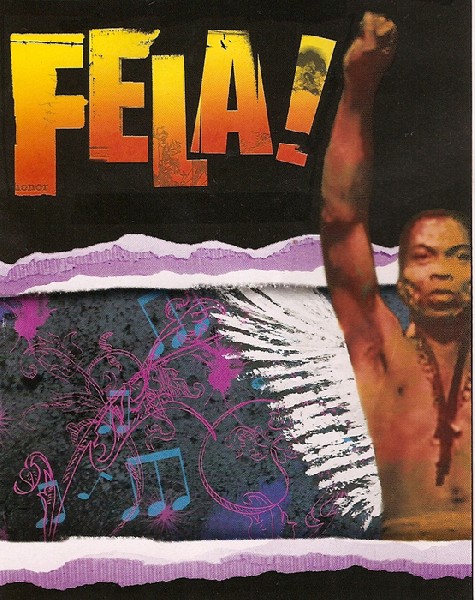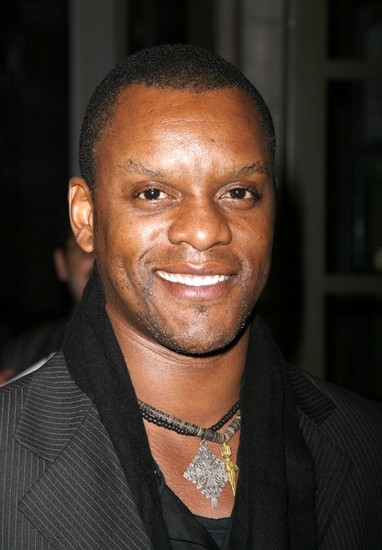Fela! Nominated for 11 Tony Awards
Bill T. Jones to be Honored by Jacob's Pillow
By: Charles Giuliano - Nov 18, 2009
Fela!
Book by Jim Lewis and Bill T. Jones
Directed and Choreographed by Bill T. Jones
Music and Lyrics, Fela Anikulapo-Kuti
Additional Lyrics, Jim Lewis, Additional music, Aaron Johnson and Jordan McLean;
Based on the life of Fela Anikulapo-Kuti; Conceived by Bill T. Jones and Stephen Hendel; Scenic and Costume designer, Marina Draghici; Lighting, Robert Wiertzel; Sound, Robert Kaplowitz; Projection designer, Peter Nigrini; Wig, hair and makeup, Cookie Jordan; Production stage manager, Jon Goldman, Casting, Mungioli Theatricals, Arnold J. Mungioli, CSA; Press Richard Korenberg & Associates, Musical Direction, Aaron Johnson
Cast: Kevin Mambo alternating with Sahr Ngaujah (Fela), Lillias White (Funmilayo), Saycon Sengbloh (Sandra), Ismael Kouyate (African chanter and other roles), Gelan Lambert (J,K, Braiman and other roles), Ensemble.
Band: Aaron Johnson, Conductor, trombone, keyboard; Greg Gonzalez, Assistant Conductor, drums, percussion, Jordan McLean, trumpet; Jeremy Wilms, bass, keyboards, percussion; Ricardo Quinones, guitar, percussion; Alex Harding, baritone sax; Yoshihiro Takemasa, percussion; Stuart Bogie, tenor sax, percussion; Dylan Fusillo, percussion; Music Coordinator, Michael Keller
The Eugene O'Neill Theatre
230 West 49th Street, New York, NY 10038
Arriving at the Eugene O'Neill Theater we began to feel the excitement and energy of the ambiance while anticipating the performance of Fela!, a new musical directed and choreographed by Bill T. Jones, based on the life of the Nigerian, musician, composer and political activist Fela Anikulapo-Kuti (born October 15, 1938- died, August 2, 1997).
The design of the set extends beyond the stage with an eclectic m�lange of primitivist paintings, graphic design, posters, projections and artifacts. This funky motif is seen on stage with bare pipe scaffolding creating a second level as well as suggestions of doors, rooms, and modular spaces. Since there is no curtain we watch the musicians saunter on stage and begin to jam.
Welcome to the sprawling nightclub of the charismatic, brilliant, and controversial Fela Anikulapo-Kuti. We are situated in his complex that combined a living space for his some 27 wives, extended family, musicians and associates. It also functions as a show place for performances, rallies, rituals and whatever strikes the fertile imagination of the cult leader.
Through an evening in two acts Fela narrates his life story as well as ongoing struggles with politicians and police that forged him as a Pan African celebrity and hero. It also resulted in some 200 arrests, brutal beatings, rapes and murders of his clan and destruction of the compound when it was raided by a thousand goons.
Now and then, the ghost of his mother, a pioneering feminist, Funmilayo, passes by. We learn that she was thrown from a window during the massacre and later died of her injuries. She, like her son, was a martyr but for a cause and issues that we never fully come to understand. There is a litany of capitalism and colonialism spelled out in song and dance. But it rounds up the usual suspects with nothing new to add to a complex topic. It is the familiar mantra that naming is knowing.
This production Fela! as conceived, co written with Jim Lewis, directed and choreographed, by Bill T. Jones, evokes the spirit and charisma of the Nigerian musician and political activist. But we leave the theatre with unanswered questions about his persona, motives, and the plethora of conundrums that inspired love and hate. While we come to admire his genius, the power of the music and dance he inspired, we are not sure whether we understand, respect, or even like him as a man and human being.
There is a lot of charm and swagger in this Fela. He asks us what we think of his colorful, embroidered pants suits. In the second act it seems gratuitous when he takes off his shirt. It doesn't seem connected to the narrative and is more about showing off his physique.
Truly Fela was a towering presence in the evolution of Afro Pop. Indeed, he was its originator and greatest exponent. There is a back story, while dropping out from studying medicine, in London, he gets turned on to music. Mostly American jazz and soul. James Brown is an obvious influence but Frank Sinatra is less so. The musical achievement is monumental. It is understandable that Bill T. Jones, who is known for advocacy in his work, would take this on. But too often Jones bludgeons audiences with his strident approach of agit prop and here again the production lacks insight, nuance, or grace.
This is a new artistic challenge for Jones who is reaching beyond dance to a wider embrace of theatre. In the aspects of music and dance the production reaches its greatest strength and impact. But the narrative is fractured and uncompelling. When it bogs down, and obfuscates the flow of action, Fela and the company break into song and dance. Which they do magnificently. The band is terrific and the musicians really cook.
Now and then Fela straps on a tenor sax which has an African touch with collaged elements of shells and ornament. But it is too evident that he is faking it as the superb licks are actually played by Stuart Bogie. There is a compelling scene that features a baritone sax solo by Alex Harding.
Based on the sensational song and dance this is bound to be a Broadway hit. But Fela! could have been so much more.
The lead of Fela alternates between Kevin Mambo and Sahr Ngaujah. Mambo was born in Zimbabwe but grew up in Canada. He has trouble conveying the consistent tone and cadence of an African dialect. By contrast, Ngujah, a native of Sierra Leone, appears to not have that issue. He won an Obie for originating the role off Broadway. On the night we attended Mambo performed the lead role. That may have influenced some of our disappointment but greater blame lies with the script and direction.
There was much about Mambo's performance that was powerful and riveting. But too much was resting on his shoulders.. He is both narrator and lead character. At times he talks with the audience and asks us to cheer, stand, and feel the music. Some of that is forced like when we all stood up but nothing really happened with the audience. Then he told us to sit down. From narrator he slips into character to play a scene. From performer and entertainer he elides into polemicist as he denounces oppression and the harassment of the mosquitoes (police) who are also presented as Zombies (a hit song that evoked tragic backlash).
It seems that Fela actually aspired to form his own political party and run for president. After the Berlin Jazz Festival most of his band quit when it was learned that he intended to keep the money for his political campaign. None of this is very clear within the confines of the musical.
Although there are many actors, dancers and musicians on stage Fela does most if not all of the talking. Jones has not opted to have him interact with others. This makes his Fela all the more egocentric. He is so taken with his convictions that there is no need to discuss them. Other than in a brief sequence with Saycon Sengbloh (Sandra). She was the attractive young member of the Black Panther Party who politicized him during a period in California. This sequence is brief and unresolved.
Although we question his hedonism and exploitation of women none of this is spelled out or explained. There might have been more interaction with the women representing his 27 wives. Just what did they think of him and their arrangement? Contrasted with this is the vision of his mother, a martyr and saint. It is the old dichotomy of mother (Madonna) but women as puta. Lillias White (Funmilayo) won an Obie for her performance and will likely be nominated this season for a Tony. She is indeed phenomenal but again we wonder why Jones does not opt to have Fela and his mother interact directly. In a dream sequence he seeks her out through ritual He comes upon her as a shade. The scene seems forced and contrived. In death she has nothing to say. It is too late.
Yes, the music is sensational but there are too many unfulfilled elements. This tantalizing glimpse encourages us to find the true Fela on our own. It urges us to experience his music. Fela! is edgy and evocative but also a muddled jangle of raw nerves. This is no way to run a revolution.
NY Times preview by Jon Pareles
NY Times review
Bill T. Jones interview
BFA's Ken Ross on Bill T. Jones

